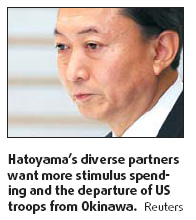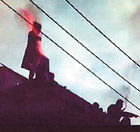Asia-Pacific
Japan PM's support below 60% as coalition bickers
(China Daily/Reuters)
Updated: 2009-12-08 09:34
TOKYO: Support for Japan's government has fallen below 60 percent for the first time since taking office in September, a survey showed on Monday, as it struggles to craft an economic package and resolve a security feud with Washington.

Support for Prime Minister Yukio Hatoyama's government, which came to power after trouncing the long-dominant Liberal Democrats in an August election, stood at 59 percent, down 4 points from last month's survey and off initial highs of more than 70 percent, a Yomiuri newspaper survey showed.
Among those who said they do not back the cabinet, 27 percent cited Hatoyama's lack of leadership, up 13 points from the previous survey, the daily said, a potentially ominous sign ahead of an upper house election in mid-2010.
Voter dissatisfaction with Hatoyama's explanations of a political funding scandal also appear to be eating into his support, the newspaper said.
Hatoyama said Monday the government would decide on the stimulus package that day but Chief Cabinet Secretary Hirofumi Hirano said formal approval would be today.
The government wants to avoid a return to recession ahead of the upper house election.
The economy, mired in deflation and hit by a rising yen, is only just out of its worst recession since World War II.
The ruling Democratic Party, also concerned about inflating a massive public debt that is already headed for 200 percent of GDP and faced with falling tax revenues, is seeking total fiscal spending of 7.1 trillion yen ($79 billion). That would comprise 4 trillion yen in immediate spending and 3 trillion yen in tax grants to local governments.
But outspoken banking minister Shizuka Kamei, who heads the small People's New Party, rejected the proposal, forcing the cabinet to postpone a meeting to sign off on the package.










